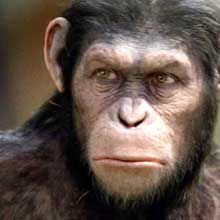The endless slew of remakes, reboots and prequels only gets more complicated with every year. Rise of the Planet of the Apes is, as far as I can tell, a remake of Conquest of the Planet of the Apes, a prequel to an as-yet unmade remake of the original Planet of the Apes (or perhaps an as-yet unmade remake of the remake of the original Planet of the Apes) and a reboot of the entire Apes series, all of which was based on a book. We live in confusing times.
Fortunately, whatever you want to call this type of nth-level remake (I’m thinking of going with ‘sudden gravitational collapse’, i.e., “Rise of the Planet of the Apes is the sudden gravitational collapse of the Apes series”), Rupert Wyatt’s take on proceedings turned out to be pretty good! This is largely for two reasons.

One is an astonishingly well-realised performance by Andy Serkis and the WETA workshop, giving us, in the ape-genius Caesar, a poignant and convincing character arc that none of the human characters are able to match. The change from a wide-eyed, childlike chimp to an embittered revolutionary is made all the more impressive because the change is conveyed through body language alone.
The other reason the film succeeds is that it is played less as a summer action flick and more as a drama of personal growth and rebellion, played straight and with a traditional three-act structure that eschews the wall-to-wall montage of action sequences that plagues many blockbusters. Character development is placed ahead of action and everything has room to breathe.
Furthermore when there are action sequences they’re inventive, clear and blissfully-free of 3D gimmickry. The CGI apes have a solid weight to them and when shit kicks off they’re a formidable threat. The action has an emotional weight behind it that you often miss in shlock like Transformers where you probably don’t care whether Shia LaBeouf and his interchangeable support actresses live or die.

If there’s a complaint to be made of the film, it’s that the human characters are underwritten and largely unsympathetic. For a rebellious scientist with a personal investment in the success of his work, James Franco lacks bite and intensity, and his character is so far behind the audience by the end that it’s as if he took a wrong turn into a different film for a while. Freida Pinto, taking on the sole female role, has literally nothing to do or say that couldn’t have been done or said by someone else. Tom Felton turns up to determinedly typecast himself as the snivelling bully archetype and David Oyelowo only lacks a twirly moustache to indicate his amorality. None of these performances are bad as such, but when Caesar is leading a rebellion against the humans it would have been nice to have had some human characters to root for as well.
The only human you’re likely to care about is John Lithgow as the Alzheimer’s-suffering father of Franco’s character, but, hey, it’s John Lithgow. Of course you’ll care about him. That man is a LEGEND.